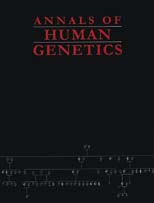Article contents
Relative efficiencies of the Chi-square recombination models for gene mapping with human pedigree data
Published online by Cambridge University Press: 01 January 1999
Abstract
In the paper by Goldstein et al. (Genomics, 1995), the authors carried out a simulation study to investigate the relative efficiencies of a no interference linkage analysis to an analysis with certain models that allow for interference. They showed that, for completely informative and independent recombination data, the analysis with the no interference model was inefficient, in the present of interference. In practice, the assumption of completely informative markers is unrealistic with data from human pedigrees. We report the results of a study investigating whether this conclusion still holds for gametes arising within pedigrees. We consider the same two mapping problems as Goldstein et al.: exclusion mapping and gene ordering. The results obtained were consistent with their findings, although the efficiency gains for analyses using the chi-square model were not as great in some cases. This is not unexpected with less than fully informative data. These results point to the need for research of developing new statistical and computational methods to incorporate interference into multipoint linkage mapping using pedigree data. This would make efficient use of available, but sometimes scarce data, especially in disease gene mapping.
- Type
- Research Article
- Information
- Copyright
- University College London 1999
- 5
- Cited by




